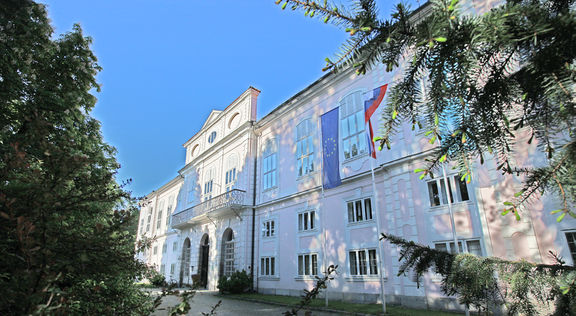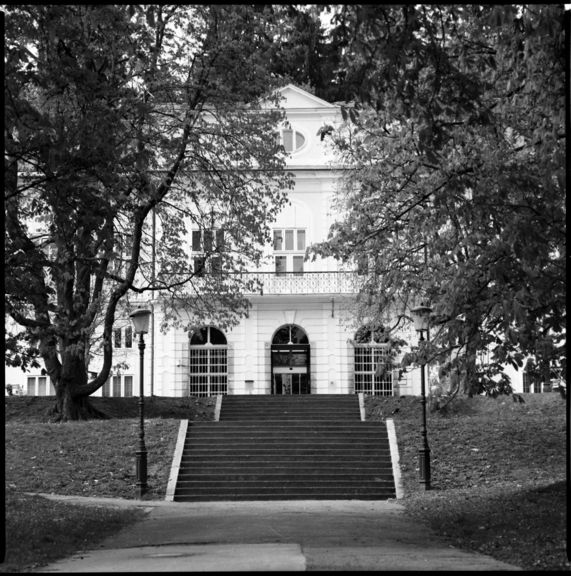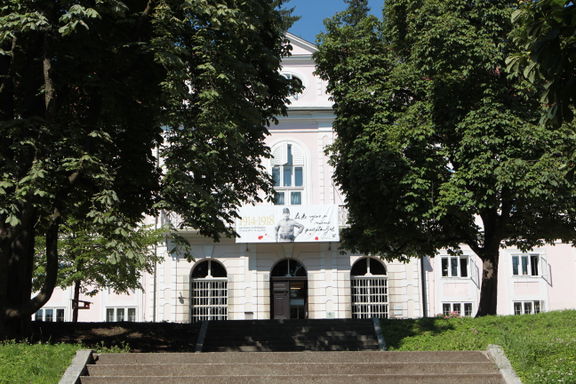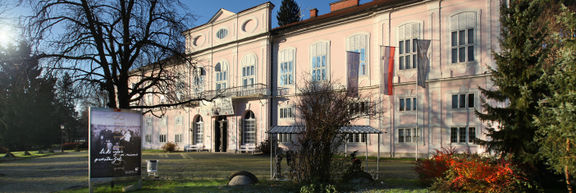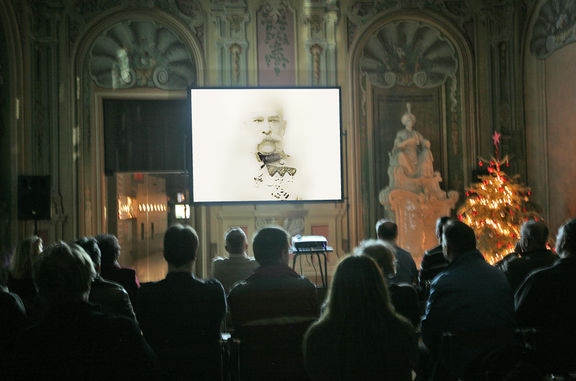Difference between revisions of "Cekin Mansion"
Anže Zorman (talk | contribs) |
(contacts) |
||
| (One intermediate revision by one other user not shown) | |||
| Line 18: | Line 18: | ||
| opening hours = 10am–6pm Tue–Sun. Close on holidays except 8. 2. | | opening hours = 10am–6pm Tue–Sun. Close on holidays except 8. 2. | ||
| contacts = {{Contact | | contacts = {{Contact | ||
| − | | name = | + | | name = Nataša Robežnik |
| − | | role = Director | + | | role = Acting Director |
| − | | email = | + | | email = |
}}{{Contact | }}{{Contact | ||
| − | | name = | + | | name = Barbara Kolenc |
| − | | role = | + | | role = Public Relations |
| − | |||
| − | |||
| − | |||
| − | |||
| − | |||
| telephone = 386 (0) 1 300 9633 | | telephone = 386 (0) 1 300 9633 | ||
| − | | email = | + | | email = barbara.kolenc@muzej-nz.si |
}} | }} | ||
}} | }} | ||
| Line 44: | Line 39: | ||
==Mansion as a museum== | ==Mansion as a museum== | ||
| − | The building was transformed into a museum by the plans of [[Edo Mihevc]] in 1952, who inserted a mezzanine above the ground floor. In the same year the Museum of National Liberation moved in. In 1992 the mansion was rearranged again by architect [[Jurij Kobe]] ([[ATELIERarhitekti]]), when the attic was converted into a warehouse, and an elevator out of steel and glass was added at the backside. The institution has expanded its scope and mission and renamed itself the [[National Museum of Contemporary History]]. | + | The building was transformed into a museum by the plans of [[Edo Mihevc]] in 1952, who inserted a mezzanine above the ground floor. In the same year the Museum of National Liberation moved in. In 1992 the mansion was rearranged again by architect [[Jurij Kobe]] ([[ATELIERarhitekti]]), when the attic was converted into a warehouse, and an elevator out of steel and glass was added at the backside. The institution has expanded its scope and mission and renamed itself the [[National Museum of Contemporary History]]. Today a renovated Knights' Hall serves as a lecture room. |
| − | |||
| − | Today a renovated Knights' Hall serves as a lecture room. | ||
{{Wide image|National Museum of Contemporary History 2015 museum evening.jpg}} | {{Wide image|National Museum of Contemporary History 2015 museum evening.jpg}} | ||
| Line 55: | Line 48: | ||
==External links== | ==External links== | ||
| − | * [http://www.muzej-nz.si/ National Museum of Contemporary History website] | + | * [http://www.muzej-nz.si/en/ National Museum of Contemporary History website] |
* [http://en.wikipedia.org/wiki/Cekin_Mansion Cekin Mansion on Wikipedia] | * [http://en.wikipedia.org/wiki/Cekin_Mansion Cekin Mansion on Wikipedia] | ||
Latest revision as of 01:48, 27 February 2023
The two-storey late Baroque mansion has a central projection and behind it an entrance hall on the ground floor and the Knights' Hall on the first floor, which used to be a dancing hall. The Knights' Hall has Baroque paintings on walls and a ceiling in Illusionistic style and two decorative stoves. The main staircase is at its backside. It is declared a cultural monument of state importance.
Mansion as a museum
The building was transformed into a museum by the plans of Edo Mihevc in 1952, who inserted a mezzanine above the ground floor. In the same year the Museum of National Liberation moved in. In 1992 the mansion was rearranged again by architect Jurij Kobe (ATELIERarhitekti), when the attic was converted into a warehouse, and an elevator out of steel and glass was added at the backside. The institution has expanded its scope and mission and renamed itself the National Museum of Contemporary History. Today a renovated Knights' Hall serves as a lecture room.
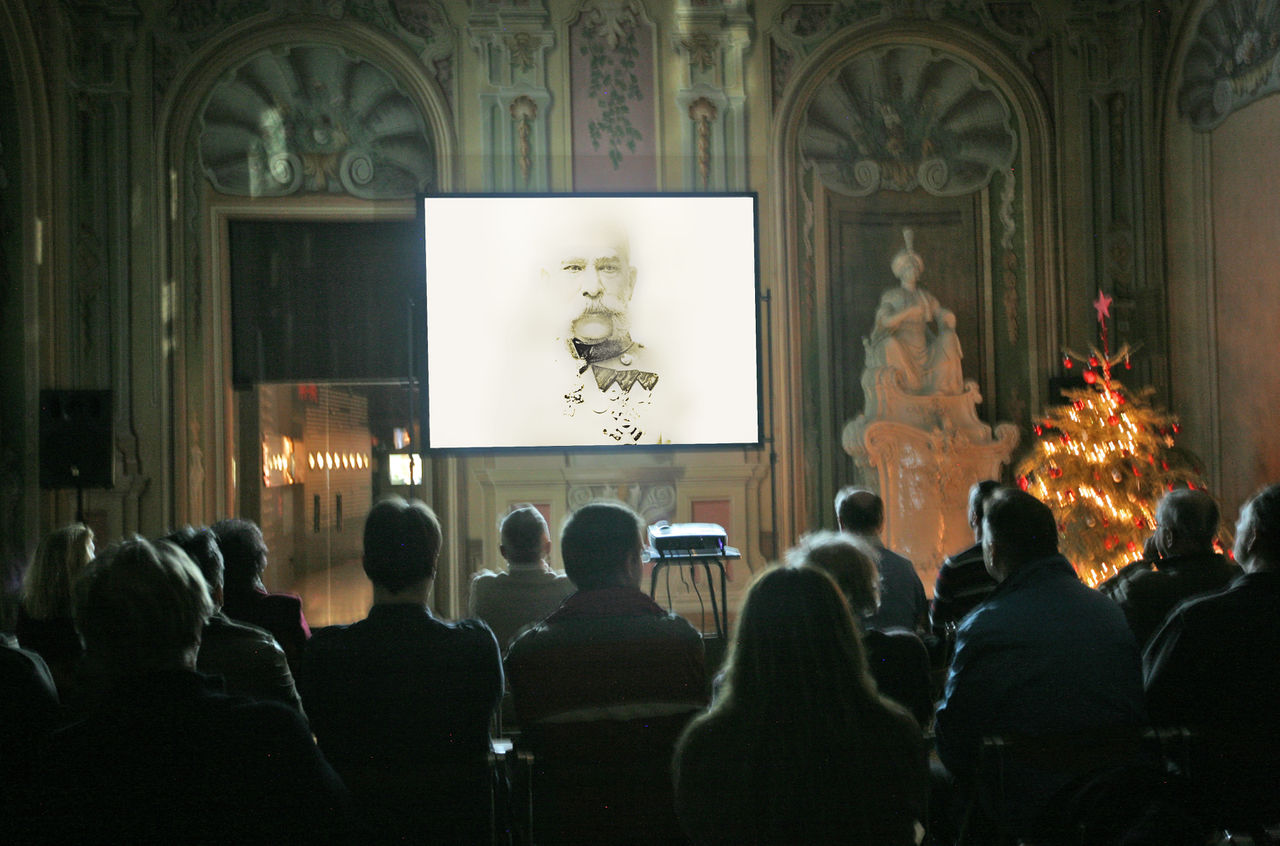 A lecture related to the centenary of the WWI in the Knights' Hall of the National Museum of Contemporary History, Ljubljana, 2015
A lecture related to the centenary of the WWI in the Knights' Hall of the National Museum of Contemporary History, Ljubljana, 2015




